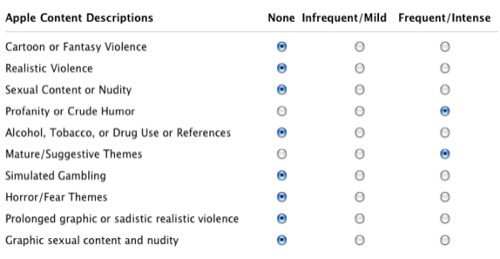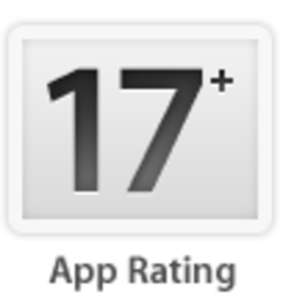Last week, iPhone developers were taken by surprise when Apple unceremoniously removed their ability to promote their “mature” applications (ages 17+) using promo codes. These codes allow application creators to raise awareness about their work by sending out free copies of apps to select individuals, such as those working in the media, in the hopes of having their new app reviewed. Now it seems that Apple has reversed this earlier, controversial decision and is allowing promo codes once again. But we have to wonder: why were they ever removed to begin with?

Last Week: Promo Codes Yanked
Perhaps the most confusing element of last week’s policy change were Apple’s new rules which counted any application containing a built-in web browser as needing to be rated 17+ simply because it would allow the user to access the internet. (Ironically, the iPhone’s built-in Safari web browser didn’t count).
Also, other potentially objectionable applications seemed to be rated inconsistently with regards to their content. For example, the risqué “Wobble iBoobs” is listed as “not rated” while e-book reader Eucalyptus was rated mature because you could use it to view a copy of the “Kama Sutra” if you so desired. As the developer of the bookmarking application Instapaper noted at the time, the current ratings form is too vague since any developer who offered “unfiltered internet access” via a built-in browser could technically check off all the descriptions on the ratings form’s list of mature content types.

Although cutting off access to promo codes wouldn’t have stopped developers from giving out free copies of their apps – other methods like distributing ad-hoc builds and iTunes gift certificates were still available – it certainly made the process that much more difficult. Plus, it was unclear as to why the policy was ever enacted in the first place. After all, the promo codes aren’t typically used to entice children to come test out “mature” applications – they’re mostly used to market the apps by providing copies to reviewers or to potential new users by way of contests or other events.
Once Again, App Store Policies Questioned
After some heavy discussion in the blogosphere, it appears that Apple has now quietly reversed their earlier, incomprehensible policy. According to TUAW, several developers are reporting that they are once again able to request codes for the 17+ apps.
While we’re glad that this time Apple has decided to listen to their developer community, that isn’t always the case. And this is by no means the first glitch to arise in the Apple iTunes App Store’s system since it launched. The company has come under fire in the past for approving clearly horrific applications by accident while lagging behind on approval of others without providing clear communication as to why. Developers are also frustrated because Apple doesn’t provide them with ways to ask about App Store rejections, in some cases only sending cryptic emails like this one simply stating that the app was not “consistent with the criteria considered in our approval process.”
Were Promo Codes Really a Problem to Begin With?
While on the surface, Apple’s prior decision to regulate the mature iPhone applications by disabling promo codes seems innocuous enough – protect the children, right? – the way they went about it came across as over-zealous and not very well-thought out. Besides, one has to wonder why they ever decided promo codes were an issue in the first place. Were these codes really being used to corrupt young innocent minds by giving them free copies of adult-themed iPhone apps? We think not.

Where Is Apple Going with “Mature” Apps?
If Apple is truly concerned about children’s access to mature content, they’ll need to come up with a better system than what they currently offer. They can either play the role of content police (much as they do now) or they can create a new system where ratings are consistent, parental controls are within easy reach, and perhaps iTunes accounts themselves are even categorized as belonging to an adult or a minor.
It’s almost certain that Apple is considering the possibilities of this sort of system – only last month they launched their new “mature content” warnings that appear when updating your apps. That system needs tweaking, however, as it doesn’t bother to inform you which apps are “mature” out of all those receiving an update.
Still, these incremental changes as to how Apple is treating mature apps point toward an overall goal of creating a system where both mature and non-mature content can safely reside side-by-side. There’s no doubt that Apple is interested in expanding their lineup of 17+ apps – those would be sure to be hot sellers capable of bringing in large amounts of additional revenue to the company. Still, Apple needs to be more careful in how they go about implementing these sorts of changes. It would almost be better if they would simply re-launch the entire ratings system and accompanying policies in one go as opposed to messing with these minor – and sometimes haphazard – updates along the way.

















